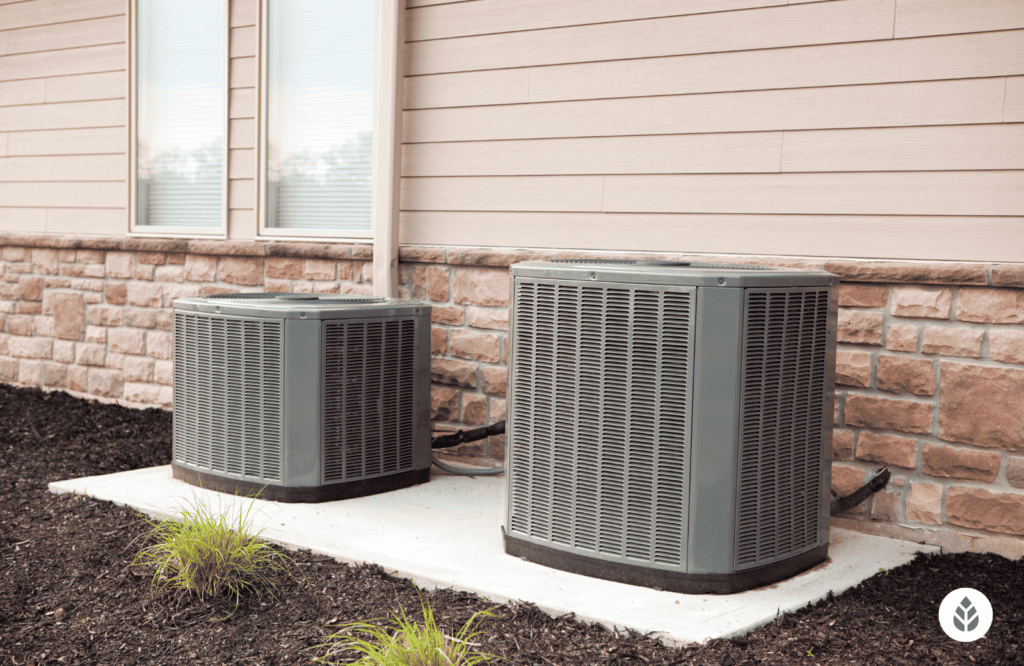Learn About HVAC
HVAC makes up the largest share of household energy use. EcoWatch is here to provide the tools you need to be a more sustainable homeowner while staying comfortable year-round.
Get Free Quotes From Approved HVAC Installers
Top EcoWatch Resources for HVAC Repair and Installation
What is HVAC?
HVAC is an acronym that stands for “heating, ventilation and air conditioning.” It’s used as a general term for the regulation of air in your home, including temperature control, air quality control, airflow and humidity levels.
The components of your HVAC system will vary depending on what type of system you have. A heat pump can both heat and cool a home. On the other hand, an AC unit only cools and a furnace only heats.
Therefore, in most cases, your HVAC system will consist of either a heat pump or a furnace and air conditioner.
Furnaces, heat pumps and air conditioners are all components of a central air system. They pump air through your home’s ductwork to distribute warm or cool air.
Why EcoWatch Covers HVAC
Here at EcoWatch, our goal is to help eco-conscious homeowners make informed decisions for their homes. That’s why we review a variety of home improvement products and services with sustainability in mind.
According to the U.S. Energy Information Administration, heating and air conditioning account for more than half of household energy consumption in the U.S., making HVAC the largest share of household energy usage.1,2
That means there is abundant opportunity to reduce your energy consumption with an energy-efficient heating and air conditioning system.
Sustainable HVAC technology has advanced rapidly in recent years, making it easier than ever before to upgrade to a green heating and cooling system.
When replacing or upgrading your HVAC system, you’ll first want to look for Energy Star-certified products. Air source heat pumps and geothermal heat pumps are considered the most efficient green HVAC systems available.
Air Source Heat Pumps
Air source heat pumps distribute hot or cool air into a building by drawing in outside air and moving it over a coil that makes a heat exchange. Air source heat pumps are very efficient and come in several varieties:
- Mini-split heat pumps: A mini-split system is a type of air source heat pump that has an indoor unit and an outdoor unit.
- Multi-split heat pumps: This type of air source heat pump is a split system that has multiple indoor units that connect to one or multiple outdoor units. This type of heat pump is commonly used in apartments and commercial buildings.
- Variable refrigerant flow heat pumps: A VFR heat pump is like a multi-split heat pump, but it can heat and cool at the same time.
Geothermal Heat Pumps
Also known as ground source heat pumps, geothermal heat pumps draw in solar energy from the ground to heat or cool a building.
Although geothermal heat pumps are far more expensive than air source heat pumps, they will save you a significant amount on energy bills. A geothermal heat pump will typically pay for itself within five to 10 years.3
Editorial Contributers

Karsten Neumeister, EcoWatch Writer & Editor
Karsten is an environmental specialist passionate about sustainable development. Before joining EcoWatch, Karsten worked in the energy sector of New Orleans, focusing on renewable energy policy and technology.

Dan Simms, EcoWatch Writer
Dan is an experienced writer and solar and EV advocate. Much of his work has focused on the potential of solar power and deregulated energy, but he also writes on related topics like real estate and economics.

Kristina Zagame, EcoWatch Writer
Kristina is a writer with expertise in solar and other energy-related topcis. Before joining EcoWatch, Kristina was a TV news reporter and producer, covering topics including West Coast wildfires and hurricane relief efforts.

Faith Wakefield, EcoWatch Writer
Faith is a writer who loves incorporating arts and the environment in her community. Before joining EcoWatch, her background included event management and technical publishing.

Melissa Smith, EcoWatch Executive Editor
Melissa is an editor and content expert who has worked extensively on topics like solar and renewable energy for the past several years. Her background spans both eco news outlets and environmental nonprofits.
How Often Should You Have Your HVAC Serviced?
HVAC maintenance is typically recommended twice per year and includes:
- Checking and replacing air filters
- Cleaning condenser and evaporator coils
- Checking for potential leaks
- And more
Click the link below to read the full article.
AC Not Cooling? Here's What We Recommend
When diagnosing your air conditioner’s issue, here are a few things to check:
- Does your thermostat need to be reset?
- Do you have a refrigerant leak?
- Does your ductwork need repair?
- Is your air filter dirty?
Click the link below to read more.
How HVAC Systems Work
Although there are multiple types of HVAC systems, they all work fundamentally the same way to regulate air quality and temperatures in your home.
For starters, it’s important that your home has ventilation – fresh air coming into your home – to maintain oxygen levels, remove carbon dioxide and keep out moisture and odors.
Your home has both natural ventilation and mechanical ventilation. Natural ventilation is the air that naturally escapes from gaps around your windows, doors and vents.
Mechanical ventilation draws air into the HVAC system to help circulate clean air through your home. Once the air is in the HVAC system, the air goes through an air filter to extract dust, dirt, pollen and other allergens.
Once the air has gone through the HVAC filter, it is heated or cooled before entering your home.
How air is directed into your home depends on the type of HVAC system you have. For instance, if you have a central heating and cooling system, the air will move through air ducts into different rooms. Ductless systems are smaller and only heat or cool one room.
Most HVAC units distribute air throughout a home with a forced air system. A forced air system is what it sounds like: It “forces” air through your air ducts to heat and cool different rooms in your house.
How Do Heat Pumps Work?
A heat pump draws heat from outside, circulates it between the air handler and compressor, and directs air inside to heat your home. To cool, it absorbs indoor heat and releases it outdoors.
How Do Air Conditioners Work?
Your indoor air conditioner unit draws in warm air from inside your home. The air conditioning unit has a refrigeration system inside it. As the indoor unit pulls in warm air, the air is drawn over a cooling coil with refrigerant. This cools the air that is then blown back into the house.
The heat stored in the refrigerant is released outside as the refrigerant turns back into a liquid from a gaseous state.
5 Key Facts About HVACs
Are you considering an HVAC replacement or upgrade? Here are the top 5 facts about HVAC that you’ll want to keep in mind:
1. HVAC goes beyond heating and cooling.
Your HVAC system does more than just heat and cool your home. It helps ventilate and filter your air to improve indoor air quality.
HVAC helps keep the air in your home clean by filtering air before it vents into your home.
Ventilation systems reduce the prevalence of airborne viruses and allergens in your home, and they also keep out excess moisture and carbon dioxide.4
2. HVAC systems usually last 10–25 years.
How long your HVAC system will last depends on the type of equipment you have and how well you’ve maintained it.
Every HVAC system is different. The different parts of your HVAC system may consist of any or all of the following: heat pumps, boilers, furnaces, air conditioners, water heaters and a thermostat. Each of these components has a different lifespan.
When possible, keep track of the age of each component of your HVAC system. If you’re getting an entirely new system installed, even better. You can ask your HVAC technician what equipment they installed and the expected lifespan of each piece.
3. HVAC inspections and maintenance help your system last longer.
Research has shown that 70%–90% of HVAC units are not running as efficiently as they could, either due to faulty installation or lack of maintenance.5
Simple maintenance like changing your air filter every few months is an easy way to make sure that your system is running efficiently.
You should also have your heating and cooling systems checked regularly. An annual inspection of your heating and cooling systems can protect you against inconvenient HVAC failures.
4. On average, an HVAC system costs $5,000–$10,000
Although HVAC systems are expensive, there are financing options available. HVAC systems can typically be financed with personal or home improvement loans. Talk to your HVAC contractor about financing options.
5. A new HVAC system can reduce your energy bill.
According to Energy Star, high-efficiency heat pumps or air conditioning units can save you up to 20% in heating and cooling costs compared to their standard versions.6
Even better, according to the U.S. Department of Energy, an air-source heat pump can reduce your electricity use by 50% compared to traditional heating systems like furnaces and baseboard heaters.7
A heat pump can heat and cool your home, while an air conditioner can only cool it. Most homes with an air conditioner for conditioner will have a furnace for heating in the cooler months.
Talk to an HVAC contractor to discuss what HVAC equipment is best for you and the energy efficiency of your home. The more energy efficient your HVAC system, the more you’ll save on energy bills.
What HVAC Contractors Do
Skilled HVAC contractors understand the mechanics, science and math behind home systems while also doing a physically demanding job.
HVAC services, including maintenance, repairs and installations will be necessary over the lifespan of your heating and cooling system. Here’s what to expect when you call an HVAC contractor:
1. Maintenance
An HVAC system is not simple. Scheduling regular preventative maintenance with an HVAC professional will prolong the life of your heating and cooling system.
Hire professional heating system maintenance in the early fall and cooling system maintenance in the early spring. That way, you can solve any problems before the weather is extreme.
For heating system maintenance, a professional will check wiring, exhaust outlets, burners, heat exchangers, fuel lines and more. They will clean and lubricate any moving parts as well.
Cooling system maintenance entails inspecting pans, coils, wiring, refrigerant levels and blower system components as well as calibrating the blower.
This maintenance will keep your system working properly and ready for the next season.
2. Repairs
An HVAC technician can help you identify issues in your system. Here are some common HVAC problems that will make your HVAC system less energy efficient:
- Clogged air filters
- Tripped breakers or blown fuses
- Dirty evaporator or condenser coils
- Other mechanical problems from typical use
If you’re noticing higher energy costs or other changes in the everyday functioning of your HVAC system, an HVAC contractor can identify your issue and complete a repair.
3. Installations
If your HVAC system is getting older, you’ll want to bring in an HVAC technician to advise you on an HVAC replacement. As your system ages, you’ll want to look out for these signs that could indicate you need an HVAC installation:
- Your home is consistently hotter or colder than the temperature you set on your thermostat
- Your home is too dry in the winter or too humid in the summer
- Your energy bills are higher than usual
- Components of your HVAC system keep needing repairs
- Your HVAC system is making unusual noises

 233k
233k  41k
41k  Subscribe
Subscribe 
